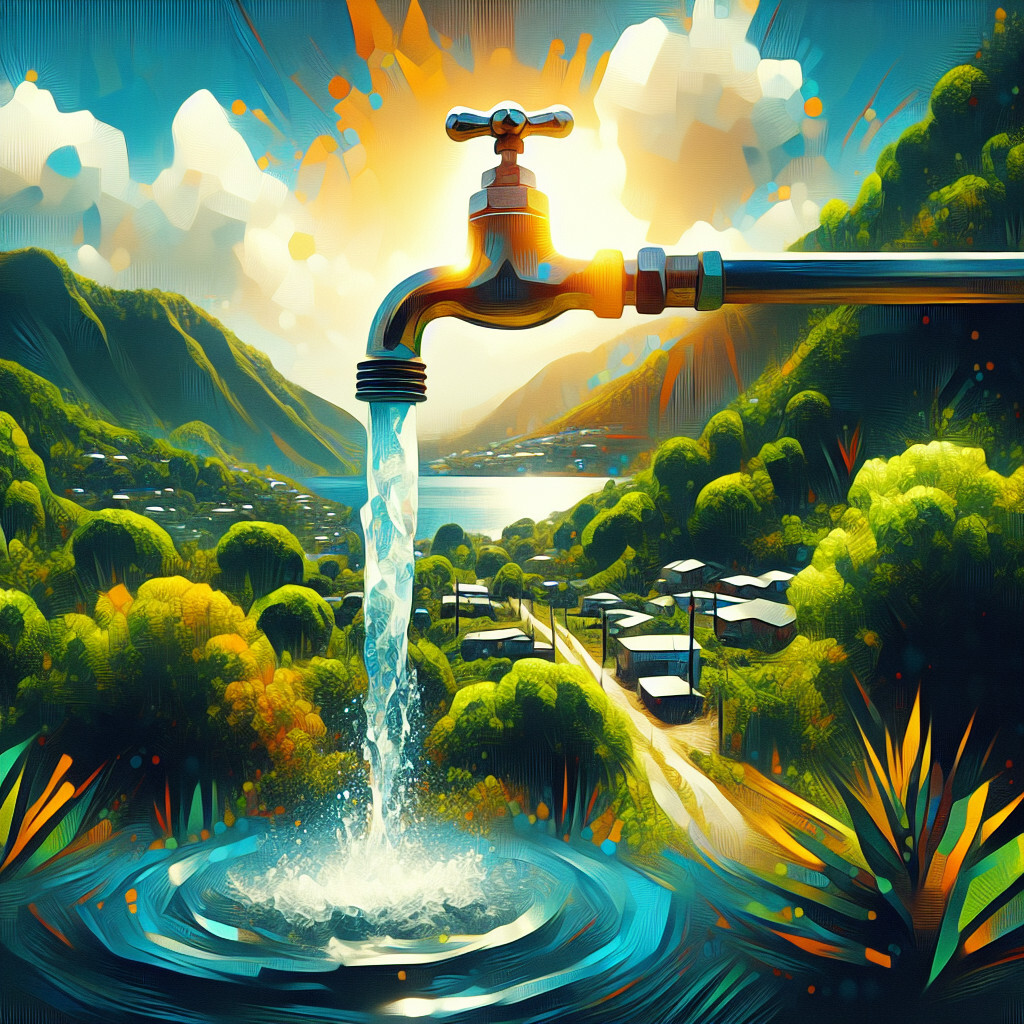-
Table of Contents
- Introduction
- Understanding the Quality of Tap Water in St. Vincent and the Grenadines
- The Impact of Infrastructure on St. Vincent and the Grenadines’ Tap Water
- Health Implications of Drinking Tap Water in St. Vincent and the Grenadines
- Sustainability and the Future of Tap Water in St. Vincent and the Grenadines
- Q&A
- Conclusion
“St. Vincent and the Grenadines: Where the tap water is generally safe, but bottled water is recommended for tourists.”
Introduction

St. Vincent and the Grenadines, a southern Caribbean nation, has a public water supply that is generally considered safe to drink. The Central Water and Sewerage Authority (CWSA) is responsible for the water supply services in the country, ensuring the water undergoes treatment and regular testing to maintain its quality. However, in some rural areas, the tap water may not be as reliable due to infrastructural limitations. Therefore, it’s recommended for visitors to confirm the water safety or opt for bottled water.
Understanding the Quality of Tap Water in St. Vincent and the Grenadines
St. Vincent and the Grenadines, a beautiful island nation in the Caribbean, is known for its stunning beaches, lush rainforests, and vibrant culture. However, one aspect that often goes unnoticed by tourists and locals alike is the quality of its tap water. Understanding the quality of tap water in St. Vincent and the Grenadines is crucial for both residents and visitors, as it directly impacts health and wellbeing.
The tap water in St. Vincent and the Grenadines is generally safe to drink, thanks to the country’s robust water treatment and distribution system. The Central Water and Sewerage Authority (CWSA), the primary water utility company in the country, is responsible for ensuring the safety and quality of tap water. The CWSA adheres to strict standards set by the World Health Organization (WHO) and conducts regular testing to ensure that the water is free from harmful contaminants.
The primary source of tap water in St. Vincent and the Grenadines is surface water, which includes rivers, streams, and reservoirs. This water is treated using a combination of coagulation, sedimentation, filtration, and disinfection processes to remove any potential impurities. The treated water is then distributed through a network of pipes to households and businesses across the country.
However, despite these rigorous treatment processes, there can be occasional issues with the quality of tap water in St. Vincent and the Grenadines. For instance, heavy rainfall can sometimes lead to increased turbidity or cloudiness in the water, due to runoff from the land. While this does not necessarily indicate the presence of harmful substances, it can affect the taste and appearance of the water.
Furthermore, in some remote or rural areas of the country, access to treated tap water can be limited. In these cases, residents may rely on rainwater or untreated surface water for their needs. While these sources are generally safe for use, they can be susceptible to contamination, particularly during the rainy season. Therefore, it is recommended to boil or treat this water before consumption.
In recent years, the government of St. Vincent and the Grenadines has made significant efforts to improve the quality and accessibility of tap water. This includes investing in new water treatment facilities, upgrading existing infrastructure, and implementing stringent water quality monitoring systems. These initiatives have not only enhanced the safety and reliability of tap water but also increased its availability, particularly in rural areas.
In conclusion, the tap water in St. Vincent and the Grenadines is generally safe to drink, thanks to the country’s comprehensive water treatment and distribution system. However, occasional issues can arise, particularly in remote or rural areas, and during periods of heavy rainfall. Therefore, it is always advisable to stay informed about the local water quality and take necessary precautions when needed. The government’s ongoing efforts to improve the water infrastructure promise a future where access to safe and clean tap water is a reality for all residents and visitors in St. Vincent and the Grenadines.
The Impact of Infrastructure on St. Vincent and the Grenadines’ Tap Water
St. Vincent and the Grenadines, a beautiful island nation in the Caribbean, is known for its stunning beaches, lush rainforests, and vibrant culture. However, beneath this tropical paradise lies a critical issue that affects the daily lives of its residents – the quality of tap water. The infrastructure of St. Vincent and the Grenadines plays a significant role in determining the quality of its tap water, and it is essential to understand this impact to address the water-related challenges faced by the island nation.
The water infrastructure in St. Vincent and the Grenadines is a complex network of reservoirs, treatment plants, pipelines, and distribution systems. The Central Water and Sewerage Authority (CWSA) is responsible for managing this infrastructure and ensuring the provision of safe and clean water to the population. However, the country’s water infrastructure faces several challenges that affect the quality of tap water.
One of the primary challenges is the aging infrastructure. Many of the pipelines and treatment facilities were installed decades ago and have not been adequately maintained or upgraded. Consequently, these outdated systems often fail to effectively treat and distribute water, leading to contamination and waterborne diseases. Moreover, the old pipelines are prone to leaks and breaks, resulting in significant water loss and further compromising the quality of tap water.
Another significant issue is the lack of adequate sanitation facilities. In many parts of St. Vincent and the Grenadines, wastewater is not properly treated before being discharged into the environment. This untreated wastewater can contaminate the water sources, affecting the quality of tap water. Furthermore, the country’s hilly terrain and frequent heavy rains exacerbate this problem by causing runoff that carries pollutants into the water sources.
Climate change also poses a significant threat to the water infrastructure in St. Vincent and the Grenadines. Rising temperatures and changing rainfall patterns can lead to water scarcity, affecting the availability and quality of tap water. Additionally, extreme weather events such as hurricanes can damage the water infrastructure, disrupting the water supply and contaminating the water sources.
Despite these challenges, efforts are being made to improve the water infrastructure in St. Vincent and the Grenadines. The government, in collaboration with international organizations, has initiated several projects to upgrade the water treatment facilities and pipelines, improve sanitation, and enhance the resilience of the water infrastructure to climate change. These initiatives aim to ensure the provision of safe and clean tap water to all residents of the country.
In conclusion, the quality of tap water in St. Vincent and the Grenadines is significantly influenced by the state of its water infrastructure. Aging infrastructure, inadequate sanitation, and climate change pose significant challenges to the provision of clean and safe tap water. However, with ongoing efforts to improve the water infrastructure, there is hope for a future where all residents of St. Vincent and the Grenadines have access to safe and clean tap water.
Health Implications of Drinking Tap Water in St. Vincent and the Grenadines
St. Vincent and the Grenadines, a beautiful island nation in the Caribbean, is known for its stunning beaches, lush rainforests, and vibrant culture. However, one aspect that often goes unnoticed by tourists and even some locals is the quality of the tap water. The health implications of drinking tap water in St. Vincent and the Grenadines are a topic of concern and warrant a closer look.
The tap water in St. Vincent and the Grenadines is generally considered safe to drink. The Central Water and Sewerage Authority (CWSA), the primary water utility company in the country, is responsible for the treatment and distribution of water. The CWSA adheres to international standards for water quality, ensuring that the water is free from harmful bacteria and other contaminants. They employ rigorous testing and treatment methods, including filtration and chlorination, to ensure the water’s safety.
However, despite these measures, there are still potential health risks associated with drinking tap water in St. Vincent and the Grenadines. One of the main concerns is the presence of naturally occurring minerals in the water. While these minerals are not harmful in small amounts, prolonged exposure can lead to health issues. For instance, high levels of calcium and magnesium, commonly found in the water, can contribute to kidney stones.
Furthermore, the country’s aging infrastructure can also pose a risk. Old pipes can leach lead into the water, which can have serious health implications, especially for children. Lead exposure can lead to developmental issues, learning difficulties, and other health problems. While the CWSA regularly monitors and replaces old pipes, it is still a concern that needs to be addressed.
Another issue is the potential for waterborne diseases. While the CWSA’s treatment methods are effective in eliminating most bacteria and viruses, there is always a risk of contamination, especially after heavy rainfall or natural disasters. Diseases such as cholera and typhoid can be transmitted through contaminated water and can have severe health implications.
Despite these potential risks, it’s important to note that the tap water in St. Vincent and the Grenadines is generally safe to drink. However, for those with sensitive stomachs or underlying health conditions, it may be advisable to drink bottled water or use a water filter. Tourists, in particular, may want to stick to bottled water to avoid any potential health issues.
In conclusion, while the tap water in St. Vincent and the Grenadines is generally safe to drink, there are potential health implications that need to be considered. The presence of naturally occurring minerals, the potential for lead contamination from old pipes, and the risk of waterborne diseases are all factors that can impact the safety of the water. Therefore, it’s important to stay informed about the water quality in your area and take necessary precautions to protect your health.
Sustainability and the Future of Tap Water in St. Vincent and the Grenadines
St. Vincent and the Grenadines, a beautiful island nation in the Caribbean, is known for its stunning beaches, lush rainforests, and vibrant culture. However, one aspect that often goes unnoticed is the quality of its tap water. The sustainability and future of tap water in St. Vincent and the Grenadines is a topic of great importance, as it directly impacts the health and well-being of its residents and visitors.
The quality of tap water in St. Vincent and the Grenadines is generally good, thanks to the country’s abundant natural water resources and the government’s efforts to maintain and improve the water infrastructure. The Central Water and Sewerage Authority (CWSA), the main water utility in the country, is responsible for the provision of potable water and has implemented rigorous testing and treatment processes to ensure the water’s safety. The water is sourced from rivers and springs, treated to remove impurities, and then distributed to households and businesses.
However, despite these efforts, there are still challenges that need to be addressed. For instance, the country’s water infrastructure is aging and in need of upgrades to prevent leaks and ensure a consistent supply of water. Additionally, the effects of climate change, such as increased frequency and intensity of droughts and storms, pose a significant threat to the country’s water resources. These challenges underscore the importance of sustainability in the management of the country’s tap water.
Looking towards the future, the government of St. Vincent and the Grenadines has recognized the need for sustainable water management and has taken steps to address this issue. One such initiative is the Integrated Water Resources Management (IWRM) project, which aims to improve the management of water resources in the face of climate change. The project involves various strategies, including the development of a national water policy, the implementation of water conservation measures, and the promotion of community participation in water management.
Moreover, the government is also investing in infrastructure upgrades and exploring alternative water sources, such as rainwater harvesting and desalination, to ensure a reliable supply of water in the future. These efforts are complemented by educational campaigns to raise awareness about the importance of water conservation among the public.
In conclusion, while the tap water in St. Vincent and the Grenadines is generally of good quality, there are challenges that need to be addressed to ensure its sustainability. The government’s ongoing efforts to improve water management and infrastructure, coupled with initiatives to promote water conservation and explore alternative water sources, are crucial steps towards securing the future of tap water in the country. As residents and visitors, it is our responsibility to support these efforts by using water wisely and advocating for sustainable water practices. After all, water is not just a resource, but a lifeline that sustains us all.
Q&A
1. Question: Is the tap water in St. Vincent and the Grenadines safe to drink?
Answer: Yes, the tap water in St. Vincent and the Grenadines is generally considered safe to drink.
2. Question: What is the quality of the tap water in St. Vincent and the Grenadines?
Answer: The quality of tap water in St. Vincent and the Grenadines is generally good, as it meets World Health Organization standards.
3. Question: Are there any common issues with the tap water in St. Vincent and the Grenadines?
Answer: There are no common issues reported with the tap water, but like any location, the quality can vary depending on the specific area and source of the water.
4. Question: Do I need to use a water filter for the tap water in St. Vincent and the Grenadines?
Answer: While the tap water is generally safe to drink, using a water filter can provide an extra layer of protection against potential contaminants.
Conclusion
The quality of tap water in St. Vincent and the Grenadines varies. While it is generally considered safe to drink, it may not meet the standards of those accustomed to water in developed countries. Therefore, it’s recommended to boil tap water or drink bottled water.






